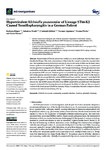Hypervirulent Klebsiella pneumoniae of Lineage ST66-K2 Caused Tonsillopharyngitis in a German Patient
Klaper, Kathleen
Wendt, Sebastian
Lübbert, Christoph
Lippmann, Norman
Pfeifer, Yvonne
Werner, Guido
Hypervirulent Klebsiella pneumoniae (hvKp) is a novel pathotype that has been rarely described in Europe. This study characterizes a hvKp isolate that caused a community-acquired infection. The hypermucoviscous Klebsiella pneumoniae (K. pneumoniae) strain 18-0005 was obtained from a German patient with tonsillopharyngitis in 2017. Antibiotic susceptibility testing was performed and the genome was sequenced by Illumina and Nanopore technology. Whole genome data were analyzed by conducting core genome multilocus sequence typing (cgMLST) and single nucleotide polymorphism (SNP) analysis. Virulence genes were predicted by applying Kleborate. Phenotypic and whole genome analyses revealed a high similarity of the study isolate 18-0005 to the recently reported antibiotic-susceptible hvKp isolate SB5881 from France and the “ancestral” strain Kp52.145; both were assigned to the ST66-K2 lineage. Comparative genomic analysis of the three plasmids showed that the 18-0005 plasmid II differs from SB5881 plasmid II by an additional 3 kb integrated fragment of plasmid I. Our findings demonstrate the genetic flexibility of hvKp and the occurrence of a strain of the clonal group CG66-K2 in Germany. Hence, it emphasizes the need to improve clinical awareness and infection monitoring of hvKp.
Files in this item

